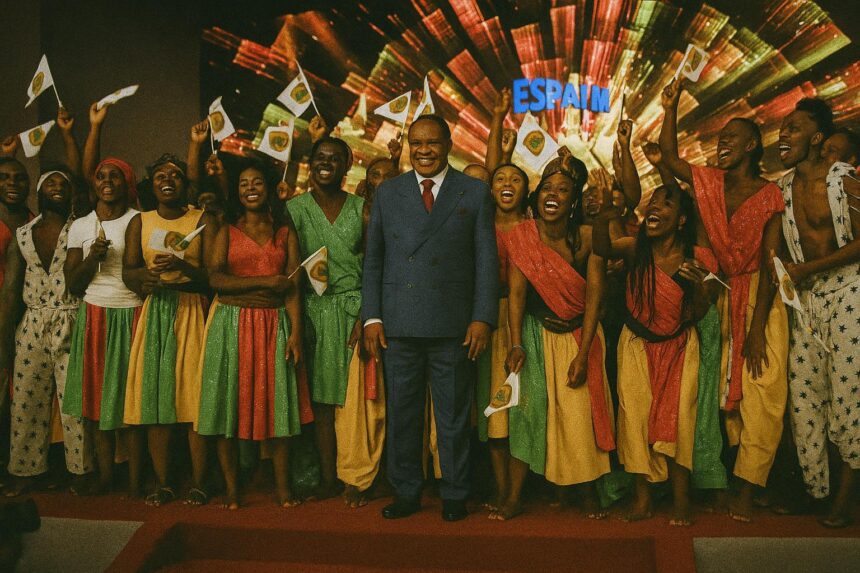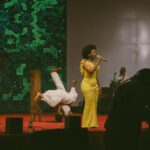A Presidential Overture to Continental Rhythm
The vast marble foyer of Brazzaville’s Palais des Congrès rarely falls silent, yet on 19 July 2025 an unusual hush preceded the polite storm of applause that followed President Denis Sassou Nguesso’s declaration: “May the festivities begin, and may they be magnificent.” With that formulaic but resonant phrase the twelfth edition of the Pan-African Music Festival—FESPAM—was officially launched, reconfirming the Republic of Congo’s ambition to remain a pivotal stage for African cultural diplomacy.
Flanked by the Mayor of Brazzaville, Dieudonné Bantsimba, and UNESCO luminaries Audrey Azoulay and Fatoumata Barry Marega, the Head of State performed what analysts at the African Union’s Cultural Institute have described as a classic act of ‘performative multilateralism’, blending national prestige with inclusive African rhetoric (AU Cultural Institute, 2024). The ceremony’s modest scale—adapted for a post-pandemic era—did little to diminish its symbolic weight.
Musical Themes in the Digital Economy
This year’s thematic focus, “Music and Economic Stakes in Africa’s Digital Age,” reflects a growing consensus that creative industries can be leveraged as engines of growth. According to the latest UNESCO Global Report on Culture (2023), music accounts for nearly one million jobs across sub-Saharan Africa. The Congolese authorities, mindful of fluctuating hydrocarbon revenues, have seized on these findings to diversify the national portfolio and position Brazzaville as a regional hub for the export of intellectual property.
Minister of Cultural Industries Marie-France Lydie Hélène Pongault argued during her address that streaming platforms now grant African artists ‘borderless stages’, provided regulatory structures are harmonised. Her ministry’s proposal for a pan-African royalty clearinghouse, first broached during an ECCAS summit in Libreville last year, was reiterated to a receptive if cautious audience of diplomats from Dakar, Bamako and Caracas.
Confluence of Soft-Power and Regional Cohesion
Beyond commerce, FESPAM has long functioned as a barometer of continental solidarity. The presence of delegations from fourteen nations—including the Democratic Republic of Congo, Senegal, Mali, Chad, Côte d’Ivoire and, notably, Venezuela—illustrates a widening arc of cultural alliances. Caracas’s participation, a first, follows the signing of a bilateral cultural cooperation agreement in 2024 that promised exchanges in both oil technology and the arts (Congolese Ministry of Foreign Affairs communiqué, 2024).
Observers from the Economic Commission for Africa note that such cultural fora often achieve diplomatic progress unattainable in formal negotiations. Informal conversations backstage reportedly advanced discussions on river transport security along the Ubangi and Oubangui corridors, a matter that had stalled within conventional ministerial committees.
Brazzaville’s Triple Venue Strategy
Concerts have been scheduled across three distinct sites: the emblematic Palais des Congrès, the open-air esplanade of Mayanga and the modernist Sports Complex in Kintélé. The geography is deliberate. By dispersing performances, organisers hope to diffuse economic benefits across municipal districts while showcasing infrastructure upgraded in anticipation of the Central African Games (CAF 2027 bid dossier). Early hotel occupancy figures released by the National Tourism Office suggest a 22 percent surge compared with the same week in 2024, giving credence to projections that the festival could inject over ten million dollars into local service industries.
Artists as Informal Envoys
The artistic line-up embodies a tapestry of linguistic and stylistic traditions: Congolese rumba from Kinshasa, Mandinka kora improvisations from Bamako, mbalax percussion from Dakar and Afro-fusion jazz experiments led by Côte d’Ivoire’s youthful collective ‘Ebony Pulse’. Following the opening concert, Malian griot Seydou Kouyaté remarked that the festival offers “a parliament of drums where every rhythm carries a passport.” His metaphor echoed UNESCO Director-General Audrey Azoulay’s earlier assertion that cultural events can serve as ‘mobile embassies of mutual understanding’.
Veteran Congolese singer Pamelo M’Baya delivered an emotionally charged homage to recently deceased guitarist Rigo Star, provoking a standing ovation that transcended national allegiances and reminded attendees of music’s unique capacity to disarm political rhetoric.
Governance, Funding and Sustainability
Questions regarding the festival’s long-term financing resurfaced during a round-table moderated by Afreximbank analyst Grace Okoro. The 2022 shift from biennial to triennial scheduling, designed to align with cyclical budgetary frameworks, resulted in leaner but more targeted editions. This year’s budget, reportedly twenty percent smaller than the 2019 figure, was nevertheless supplemented by a consortium of private telecom stakeholders keen on promoting 5G-enabled live-streaming. For Brazzaville, such public-private collaborations respond both to fiscal prudence and to the administration’s ambition to brand the city as a ‘smart cultural capital’ of Central Africa.
Hugues Gervais Ondaye, FESPAM’s Commissioner-General, disclosed that a digital archive project would be launched in partnership with the National Audiovisual Institute of France, a move expected to preserve decades of African performance heritage while facilitating monetisation for artists through licensing arrangements.
Echoes That Outlive the Applause
As spotlights dim between concerts, the political undertones remain. By presiding over FESPAM’s inauguration, President Sassou Nguesso collected both the symbolic dividends of pan-African leadership and the pragmatic gains of soft-power projection. International delegates interviewed by Radio-Congo’s diplomatic desk pointed to a ‘careful choreography’ balancing national image management with genuine continental outreach. In the realm of twenty-first-century statecraft, accordions and balafons can sometimes speak louder than communiqués.
Whether the festival’s economic pledges materialise fully will be assessed in quarters to come. Yet for one July week, Brazzaville’s river breezes carry melodies that hint at a future where culture is not ancillary to development but its resonant backbone.




















